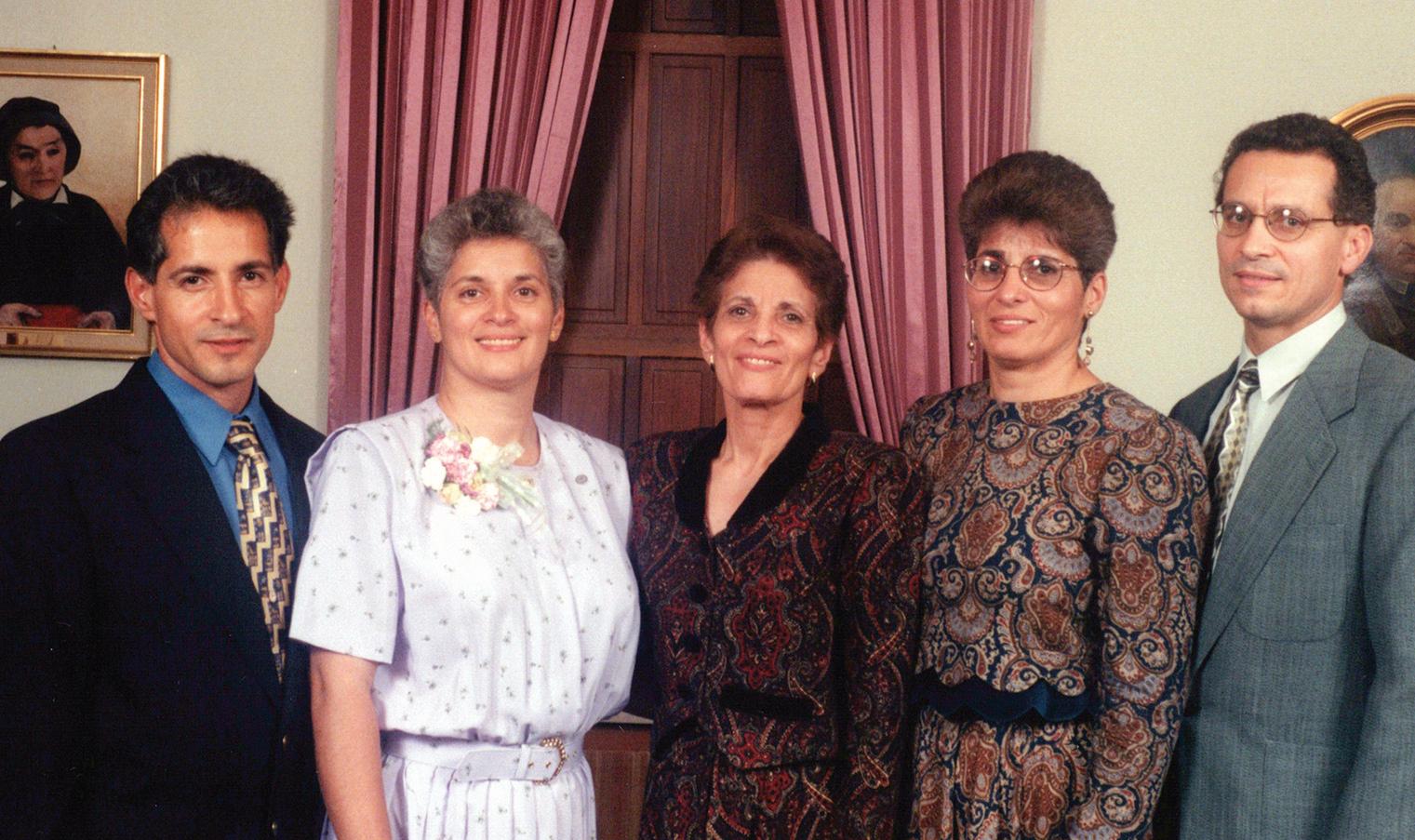
12 minute read
community
Sister Juana Mendez: Lifelong servant to the Latino immigrant community
By Vicki Welsh, Associate
Advertisement
She found herself a single parent. Life is many times more difficult when you must make all the decisions for you and your children alone. Words like “poor,” “uncertain,” “fear” can become a daily part of your life. She looks out across the wide expanse of water lifting her heart skyward remembering she must trust in God.
Her womanhood, her children, the loneliness, the everpresent water, her God. If you were to guess what was to come next, you might say you were about to hear the story of Saint elizabeth Seton (eAS). Very understandable! Saint elizabeth was a single parent and bore many of the same burdens and fears. She cared for not only her five children, but could be found helping other mothers and their children. She often lived where she could look across the water. And to the core of her being, she trusted in God.
But, no, this story is about our 2020 silver jubilarian, S. Juana Mendez. Her story reads a lot like our dear Saint elizabeth. S. Juana has this to say of their similarities, “She (eAS) dedicated her life to the services of the community, devoted a great deal of time to work with the poor, and provided free education for girls. Her desire to grow in a deep relationship with Jesus was evident in her work and style of living.”
S. Juana was one of four children born to her family in Puerto Rico. Times were hard. But she has beautiful memories of kneeling on the hard concrete floor, saying the rosary every morning as a family. While eating their breakfast of bread and coffee, S. Juana’s mother spoke to them about trusting in
S. Juana Mendez (second from left) was joined by her two brothers, sister and mother when she professed final vows 25 years ago.
God. Her mother raised them to build their hope on faith, never to stay in a place of fear. Saying the rosary was a daily reminder that God dwelled in and among them.
When S. Juana was 8 years old, the family made the arduous move to Cleveland, ohio in the San Juan Bautista parish. She attended St. Francis elementary and St. Peter’s High School. S. Juana recalls, “I loved to serve. As a young girl I knew I was being called to a religious life. However, I took the long road.”
Part of that long road was marriage, motherhood and single parenthood. S. Juana recalls, “It was a struggle to raise my children as a single mother. With the help of my family, and with lots of prayers, my children attended Catholic
For 12 years S. Juana Mendez (back, second from right) served as the Hispanic minister for the Diocese of Covington, Kentucky, advocating for and providing services for the Hispanic/Latino community.
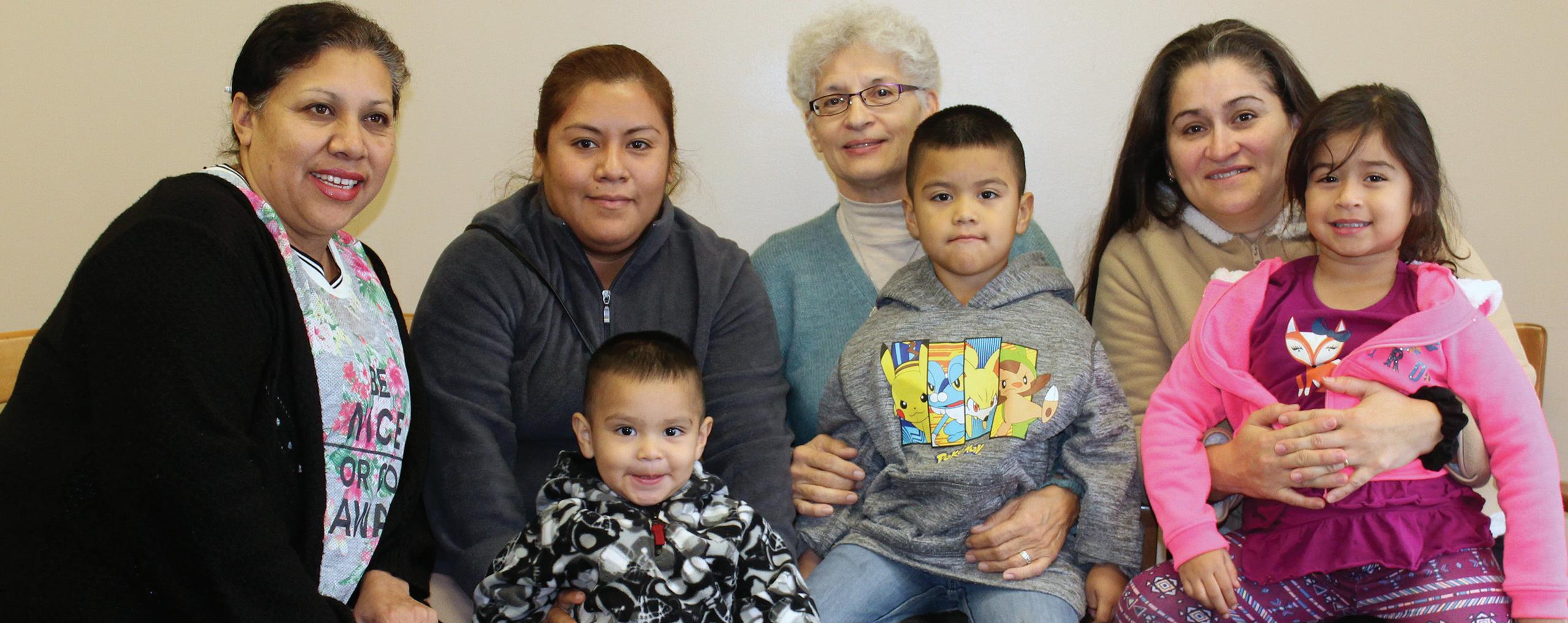
schools; two out of three attended college. They were active in the Church. My daughters played the guitar in choir and my son was an altar boy. As a family we attended Mass together. I have a close relationship with my children. I have six grandchildren that I get to talk to almost every day.”
S. Juana found employment with the Cleveland City Public School system. She performed clerical duties there for many years working her way up to a supervisory position. She continued attending San Juan Bautista parish. S. Juana picks up the story:
‘“I was searching for others who had my vision and I found the Sisters of Charity. I met two women who dedicated their lives to making a difference in the lives of others.” Those two Sisters were Sisters Florence Cremering and Ann Dorenbusch, who served at the parish and had asked S. Juana to become a Catechist. They formed a deep and lasting friendship. They also journeyed with her during her discernment process.
S. Juana’s pre-entrant year was spent as a Marianist volunteer. Later she lived one year in Parma, ohio, at a house with other Sisters of Charity. Before entering her novice year she worked with S. Maureen Heverin.
S. Juana’s novice director, S. Mary Bookser, sums up S. Juana’s story best, “S. Juana Mendez has a heart centered in love for God and for people in need. Her life experiences and her bilingual abilities allow her to minister to our immigrant sisters and brothers in a manner few of us can. Her quiet, loving response to their needs, as well as her willingness to stand up against a system which unjustly ignores and denigrates people in poverty, makes her an invaluable support to so many who live ‘on the margins.’ She lives out our beautiful Mission Statement which calls us to ‘act justly, to build loving relationships, to share our resources with those in need …’”

S. Juana Mendez served as a youth minister at San Juan Batista parish in Cleveland, Ohio, in the 1990s.

S. Juana is a true living example of our charism as she walks “in humility, simplicity, and charity” and as she has dared “to risk a caring response” throughout her 25 years as a beautiful Sister of Charity. She became Sister of Charity Juana Mendez on Aug. 1, 1995.
“My passion has always been to help those in need regardless of the consequences,” S. Juana said. “Like Saint elizabeth Seton, I founded a low-income center for the Latino community. In 1999, I was hired at the Diocese of Covington, Kentucky, as a pastoral associate. In the last 12 years I was the Diocesan Hispanic Minister. As such I advocated and provided services for the Hispanic/Latino community. I dedicated the majority of my ministry to doing immigration services. I have a BIA Accreditation1 approved by the Immigration Board of Appeal to practice immigration law.
“one positive encounter that I will always remember is when I had to travel to Mexico City, with S. Mary Kay Bush, to take a three-month-old baby to parents who had been deported.”
In March 2020 S. Juana began working at St. Michael’s parish in Cleveland, ohio, as the pastoral minister. This is a multicultural community where she ministers to the Hispanic community including some immigrants.
“My life will always be in service to the poor and the culturally marginalized,” she concludes.
Sisters Juana Mendez (left) and Mary Kay Bush (right) traveled to Mexico City to deliver Baby Yasmine to her parents who had been deported. 1A nonprofit that wants to provide legal advice to immigrants or represent them in legal proceedings needs to have a lawyer on its staff or be recognized by the Board of Immigration Appeals (BIA). “Recognition” is permission to offer the legal services. “Accreditation” is permission for a particular staff member to provide the legal services. (Sourced from Google.)
Woman as Person: Women’s Studies Program Still Impacts MSJU Curriculum
By AJ Keith, former Communications intern
The Sisters of Charity of Cincinnati is made up of powerful women dedicated to the service of others but they also take time to educate themselves on what it means to be not just a strong woman, but a strong person. Such was the case when Sister of Charity Victoria Marie Forde spearheaded the Women’s Studies program at the College of Mount St. Joseph (currently known as Mount St. Joseph university) in an effort to help women realize their value at a time of surfacing Second Wave feminism.
Second Wave feminism was a movement that occurred after World War II. Women were struggling to adjust back to their unchosen roles as housewives and mothers after supporting the united States in the workplace. While First Wave feminism focused on women’s suffrage, Second Wave feminism took civic action for women in the workplace, which inspired one Sister of Charity in particular.
When S. Victoria Marie began teaching at the College of Mount St. Joseph in 1973, she was filled with hope and beamed with opportunity. one of her first and most demanding tasks was to think of a core curriculum for the women’s college alongside fellow Sister of Charity Martha Glockner, in philosophy; Fran Harmon, in history; and Mary Ann Haubner, in mathematics. The result was establishing a Women’s Studies program through the lens of multiple disciplines and each of them were thrilled to be a part of something so pertinent to the time. As S. Victoria Marie once wrote, “each of us was enthusiastic about all we could bring to such a program.”
was initially met with scrutiny and heated responses, as some argued that an all-women’s college should innately contain acceptable information about Women’s Studies. This was one of the many instances of the program that stirred controversy, which was made all the more apparent when female students came to learn about Women’s Studies. The students that enrolled did so with the intention of learning how women could achieve equality, and it was primarily made up of married women who never completed college. Some husbands of these students were angry, fueled by their beliefs that they should have remained housewives. S. Victoria Marie said in the Spring 2019 edition of Mount News, that her goal was “to help students understand the truth about the unjust
S. Victoria Marie Forde (left) helped establish the Women’s Studies program in 1973 along with three other colleagues.
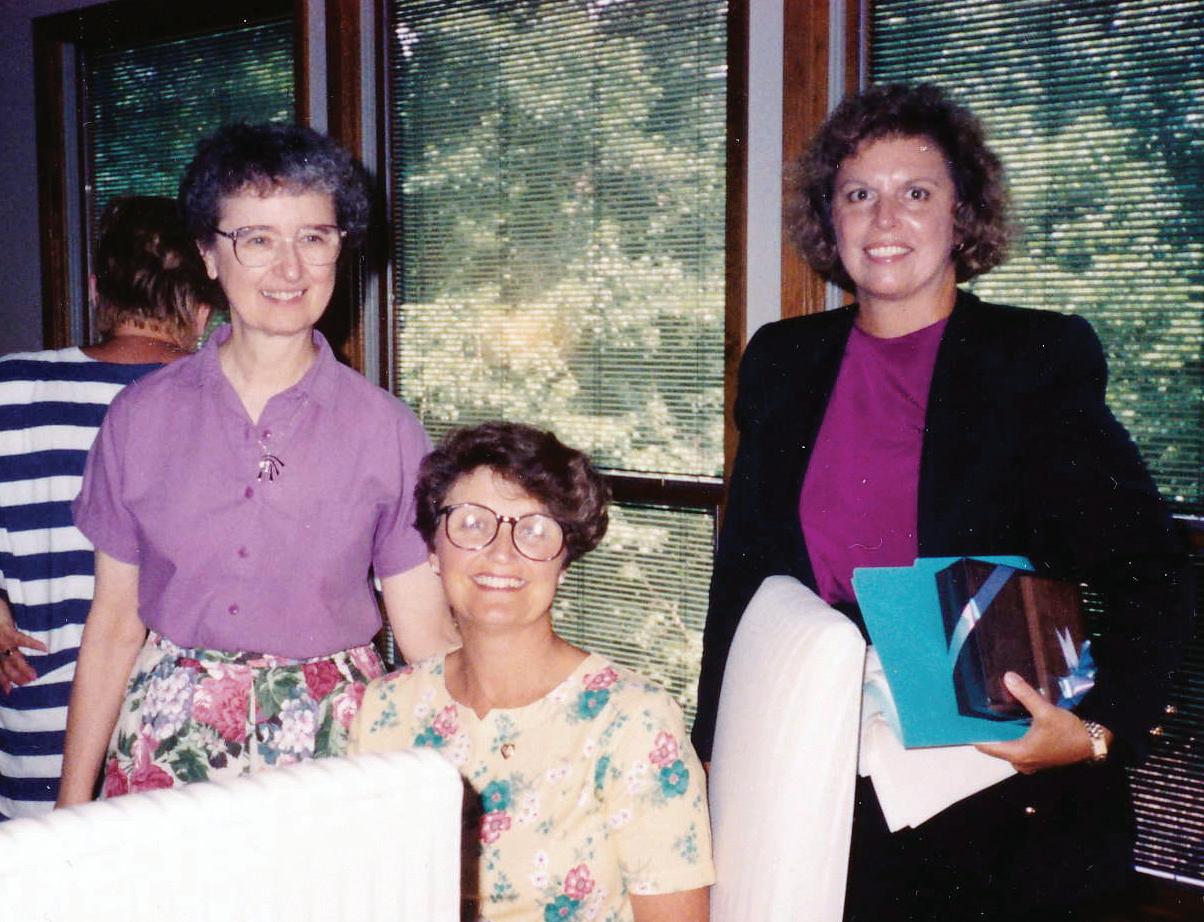
inequality of women and men in almost every area. To have them graduate with increased self-confidence and self-respect, new perspective on life and learning, and women’s impact on law, government, ministry and the arts.”
The classes were generally taught in teams to look at Women’s Studies through the areas of expertise of the professors. For example, S. Victoria Marie taught alongside Fran for a course known as Woman as Person where they used a feminist perspective to study literature and history of women, respectively. Their work, however, was having a grander impact on the college than either of them could have known.Their proposal to establish a Women’s Studies program
To celebrate the new study, the College of Mount St. Joseph hosted an event called “Women Today” in February 1973, which featured a series of plenary talks about the role of women in sports, the workplace and as people over the course of the weekend. The opening address was given by the former president of the national organization for Women (noW), Wilma Scott Heide. To counter her points, they even invited anti-feminist J.J. Jarboe in an open discussion to the convention. Heide had the utmost faith in the new study, as she stated the following in The Cincinnati Enquirer in 1973: “Women’s lib[eration] means men’s lib[eration] and that of our children. The family, to be viable in today’s society, needs for children to thrive in lib[eration]’s richness and diversity.”
The program steadily increased attendance from the beginning, as the introductory course in 1976 called “Woman as Person” had a class size of 20 people. This attendance convinced the staff at the college to make an additional certificate for the study, which would be the precursor to the minor and eventual major. When the college became coeducational, the first man, Steve Frietch, entered the Women’s Studies program in 1989. This made the program noteworthy in the Cincinnati area, especially since it was one of the only programs concerned with feminism that was successful. The university of Cincinnati attempted to create a similar program in their core curriculum, but to no avail (however, it was eventually offered as a Master’s and Doctorate program, using the college as a model to structure the classes). In 1992, S. Victoria Marie noted that more professors were trying to integrate the ideas of women’s studies into their classes in an attempt to make them gender-balanced.
The Women’s Studies program had finally gained enough steam for it to be considered a major in 1990 when it was unanimously voted upon, making S. Victoria Marie the director of the program until she retired in 1992. Succeeding her as director of Women’s Studies was Judith Sauerbrey (a current SC Associate in Mission) before stepping down in 2000. To commemorate the years of learning that resulted from this program, members of the staff and students and the College of Mount St. Joseph’s Friends of Women’s Studies gathered in a prayerful ritual in 2000 at a former student’s home. Their ritual involved dropping pebbles into a pond to see the ripples of the water that reflected their work in Women’s Studies. The prayer ended with the following quote: “…we thank [God] for all that has been, all that now is, and all that will continue from our dedication to the betterment of women and also men in our time and place.”
Though the study may have ended, the graduates with this degree took this study as seriously as all of their other classes. Louise Hess, who graduated in 1991 with honors,
S. Victoria Marie Forde (center) still meets with some of her former students for a monthly lunch, such as Mary Jo Dangel (left) and Nancy Heisel (right).
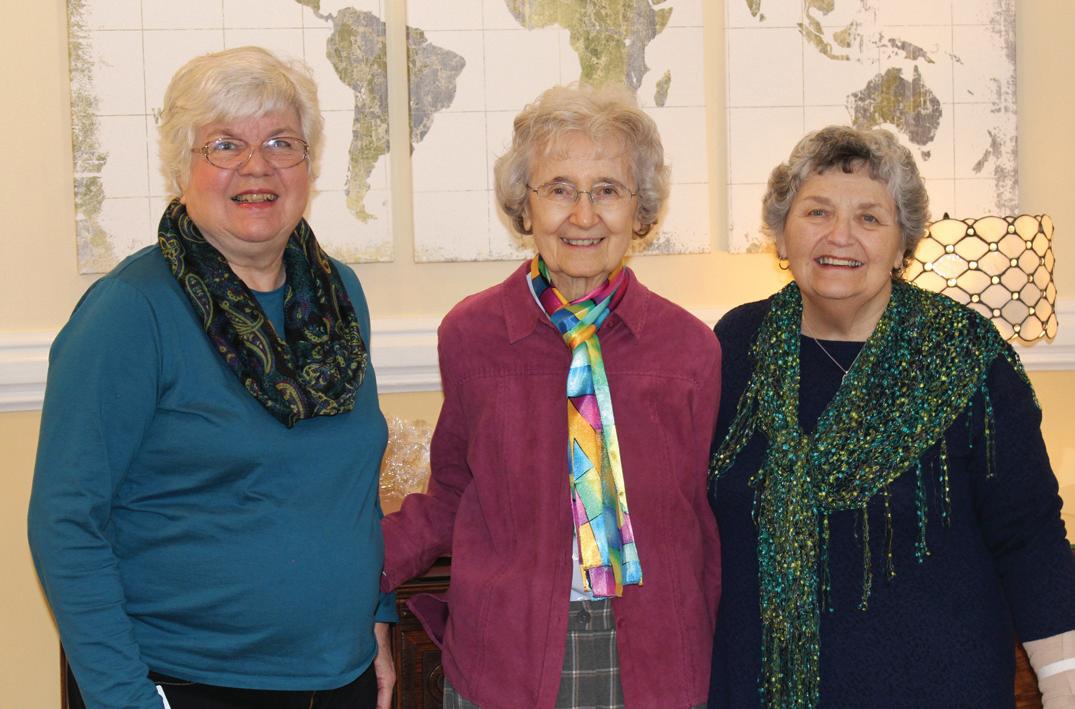
was even awarded the Distinguished Student Award and Harrington Leadership Award at graduation. The graduates also went on to pursue great careers, as Mary Jo Dangel became the assistant editor at St. Anthony Messenger and wrote articles on women’s rights because of the inspiring Women in Literature courses that she took. “Sharing stories related to the literature that we read in class brought out our own stories,” Mary Jo says. “We felt free to share in this safe space that we created.”
While Women’s Studies does not exist as a program itself today, it is engrained into the curriculum of Mount St. Joseph university. However, that does not lessen the effect that S. Victoria Marie had on the institution. Social issues are challenged through courses such as Common Ground, which explores the common good and equal treatment for all people, regardless of gender. Classes are offered which highlight the accomplishments of women, such as Professor Drew Shannon’s various Women in Literature courses that explore how women are portrayed in literature through male and female authors. “By the time I received my graduate training in the late 1990s, Women’s Studies had radically altered university curricula,” Dr. Shannon says. “Thus, it’s always been inconceivable to me to craft a course which doesn’t strive for equity between male and female authors.”
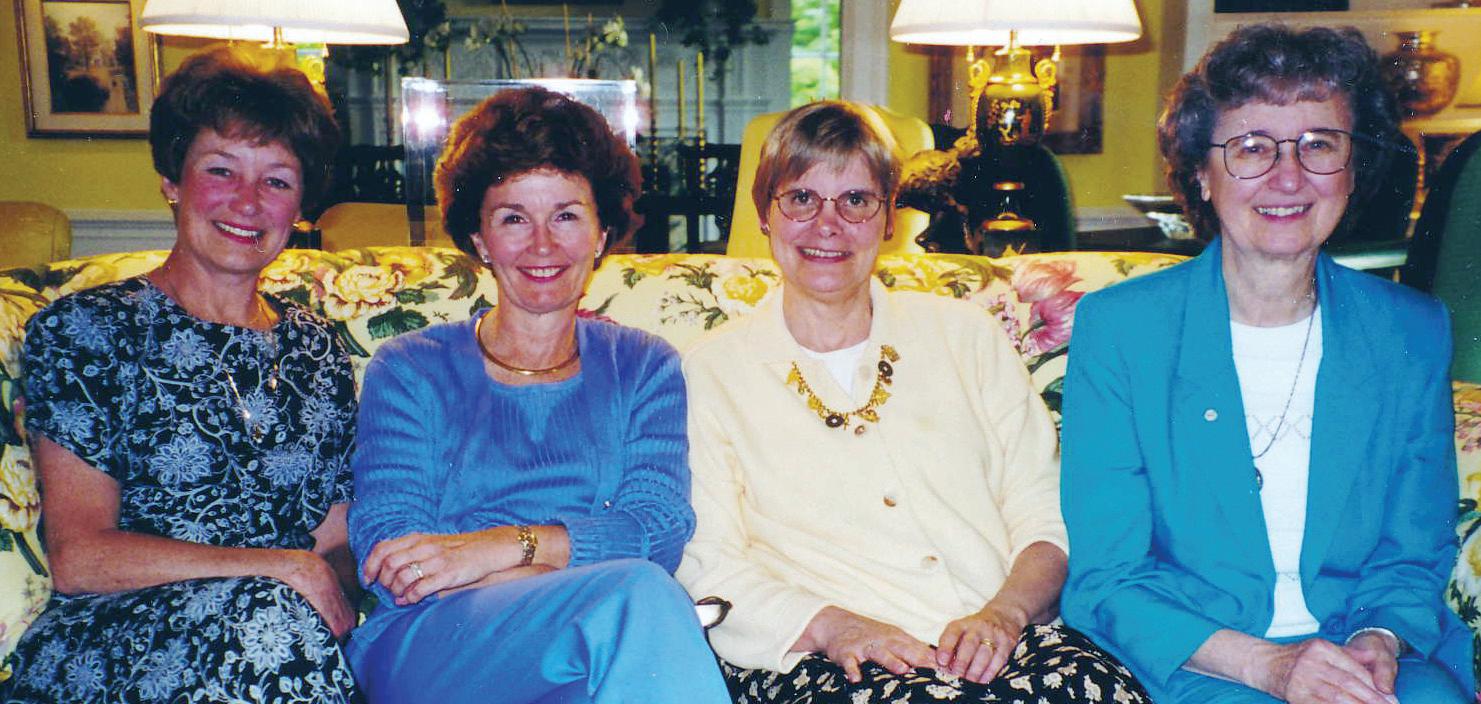
The study of women is one that cannot be overlooked because it laid the groundwork for many similar programs throughout the area and the integration of a gender-balanced curriculum at Mount St. Joseph university. S. Victoria Marie left her mark on the university and her students alike by embracing the value that all people share. To this day, some of the students have monthly meetings with S. Victoria Marie to discuss how the program empowered them.










